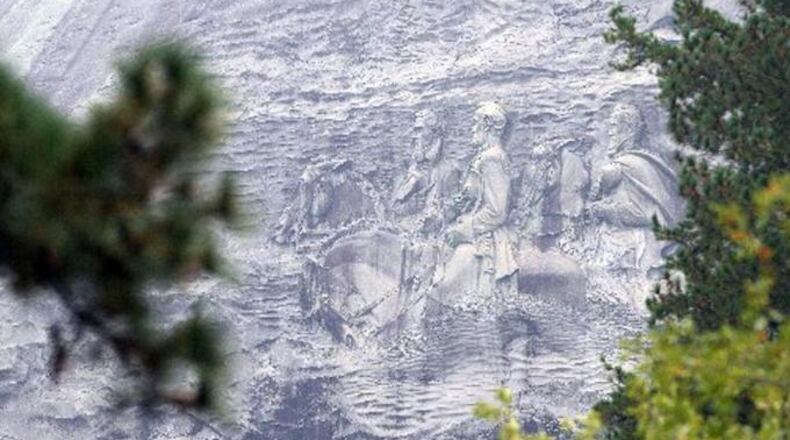The Stone Mountain Memorial Association could vote as soon as next month to make some additions to Georgia’s most popular — and most divisive — tourist attraction.
Board chairman Ray Stallings Smith III declined Monday to provide specifics about what’s being proposed for Stone Mountain Park. But he said the changes being discussed would help balance the historical picture at the home of the world’s largest Confederate monument, which has re-emerged as a cultural flashpoint during this summer’s protests over police killings of Black people and the national discourse about systemic racism.
While details were scarce, Smith said the memorial association has been discussing potential changes with Gov. Brian Kemp’s office — and that removing or altering the massive mountainside carving of Confederate leaders Jefferson Davis, Stonewall Jackson and Robert E. Lee was not on the table.
“The carving is protected by state law, as far as we’re concerned,” Smith said.
Kemp’s office declined to comment Monday about any potential changes at the park.
News of the potential additions, whatever they may be, came out of a contentious meeting in which Gregory B. Levett Sr. and Rev. Abraham Mosley, the memorial association’s two Black members, decried their colleagues’ lack of action over the years and said it was time for changes to be seriously considered.
Members of a new grassroots group called the Stone Mountain Action Coalition, whose members include Atlanta Beltline visionary Ryan Gravel, also attended the meeting.
Levett made a motion for the board to adopt suggestions made by the group — which include retiring the Confederate flags flown at the park, renaming nearby streets, and “stopping maintenance of the carving” — and submit them as recommendations to the state legislature and the governor. Those are not believed to be the changes Smith had referenced.
“We need to make decisions,” Levett said, “or get off the board.”
Smith said the motion was improper and that the board was still “in the process of doing our due diligence.” The chairman initially said the matter would be discussed in a forthcoming executive session, but a reporter from Channel 2 Action News stood up to say that would violate open meetings law.
Smith conceded and said discussions would be held in public during the board’s September meeting.
“We’re not brushing it under the rug, I assure you,” Smith said. “We’re gonna take it up, I assure you.”
The idea of a Confederate carving on Stone Mountain was originally conceived in the early 1900s, around the same time the modern Ku Klux Klan was born in the mountain’s shadow. Sam Venable, the Klan-affiliated businessman who owned the mountain and operated it as a granite quarry, originally leased the mountain’s north face to the United Daughters of the Confederacy in 1916.
Carving started in 1923 and carried on for about five years before it was halted by financial issues. Work resumed in the 1960s — a few years after the state of Georgia bought the mountain — and the completed carving was dedicated in 1970.
In more recent years, the mountain has come back into the spotlight and hosted both white nationalist rallies and counter-protests. Officials closed the park earlier this month after far-right protesters said they intended to show up for a demonstration despite their permit being denied.
The result was a tense clash between the militia-backed protesters and counter demonstrators in the streets of the nearby city of Stone Mountain.
“Having Confederate generals riding across the mountain is a symbol of hate,” Gravel said Monday. “And it’s certainly a magnet for people that hate.”
Many advocates have pushed for the carving to be removed altogether. And several local governments — including DeKalb County, where Stone Mountain sits — have recently circumvented state law to remove Confederate monuments in their communities.
But the state-owned mountain is a different political (and physical) challenge.
Previous efforts to provide a more inclusive history at the park have been hit or miss, too.
A few years ago, officials at Stone Mountain began work on a permanent museum exhibit highlighting the experience of Black Civil War soldiers. Another proposal to add a statue of Martin Luther King Jr. at the top of the mountain gained little traction.
Groups like the Stone Mountain Action Coalition are now asking officials to actively work toward making the park a place of “healing, reconciliation and natural beauty that welcomes everyone.”
“You have the power to make change,” Atlanta NAACP President Richard Rose said during Monday’s board meeting. “I beg you to use it.”
While touting the additions that could be coming, Smith said the memorial association does not have the power to do many of the things that were suggested. The association is a state agency whose purposes, as codified in Georgia law, include preserving the park’s natural areas and maintaining “an appropriate and suitable memorial for the Confederacy.”
“If you want those things to change, I would suggest that you go down to the Capitol,” Smith said.
About the Author
The Latest
Featured


